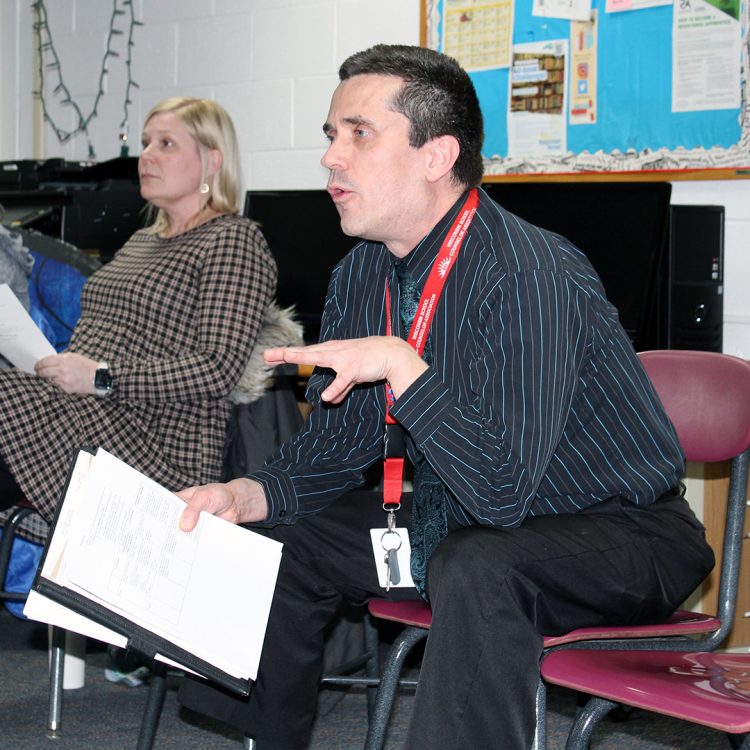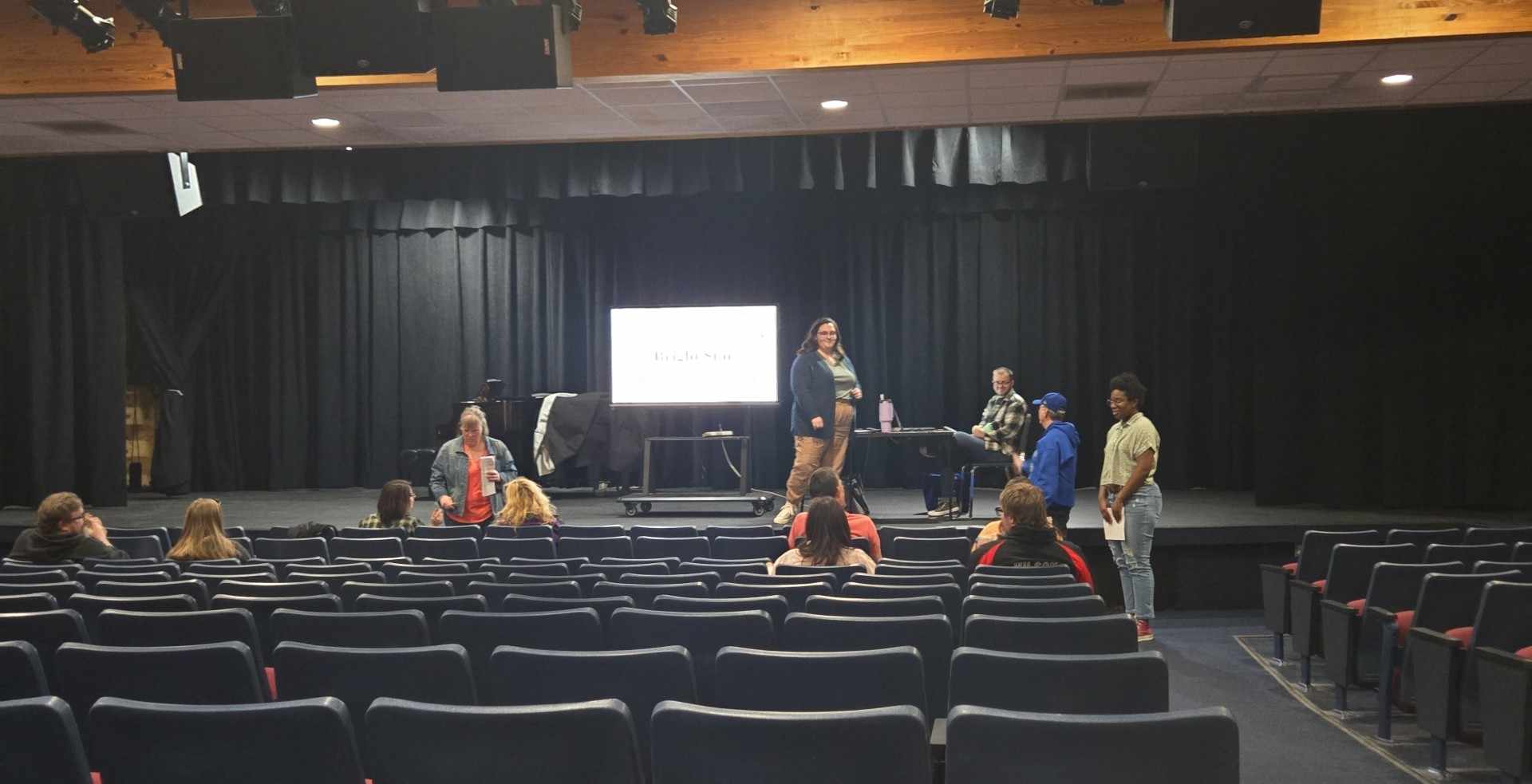Cadott School Board; Consistency important for GPA calculations


Cadott Junior and Senior High guidance counselor Russ Nelson explained the difference between the current way honor course Grade Point Averages (GPAs) are calculated, and how they proposed to calculate them to make them more consistent and less confusing. School board members voted March 13, to weight all honors courses on a 5.0 scale, starting next school year, regardless of where the course is taken. Photo by Julia Wolf
By Julia Wolf
A decision on how to handle student Grade Point Average (GPA) calculations, moving forward, was decided at a regular Cadott School Board meeting March 13.
Junior and senior high guidance counselor Russ Nelson says, as it currently stands, they weight everything in-house that is advanced placement or transcripted credits. Those honors courses are calculated on a 5.0 scale, while regular courses are calculated on a 4.0 scale. Students who take courses at CVTC, or a college or university, receive 0.75 credits for those courses, per semester, but those courses are not counted toward a student’s GPA.
Nelson says it comes down to the question of what the purpose of a weighted GPA is and what they are trying to honor by weighting certain courses.
“And if we’re trying to honor students, who are taking rigorous, challenging courses, the question then comes up of, why don’t we recognize these courses that our students are pursuing for college credit,” said Nelson.
Jenny Starck, superintendent, says there are three areas listed in the handbook that are not calculated in GPAs – service activities, credit received from institutions of higher learning/off-site courses and pass/fail courses. She says the board could consider removing the institution of higher learning one.
“We do want kids to have an incentive for taking something that’s more rigorous, but we want to be sure that it’s going to be consistent, no matter where they take that course,” said Starck.
Board member Becca Blanchette asked if colleges request non-weighted GPAs, anyway. Nelson says that is school and scholarship specific, but says weighted GPAs do count in the Wisconsin Academic Excellence scholarship, which is awarded to the student with the highest GPA. Nelson says institutions of higher learning want to see rigor and a weighted GPA is one way to motivate students to do that.
Brad Sonnentag, board member, also asked about the Laude System, which some districts use. Junior and senior high principal Caleb Hundt says that system groups students by GPAs, represented by different cord colors at graduation, so less emphasis is placed on class rank.
Nelson says whatever experiences the district wants to include can be figured into the system, such as college level courses taken, honors level courses taken, completing a full career plan, or participating in an organization or club to the highest level. Each of those are awarded a point and is multiplied by the GPA to produce the laude score. Class rank would only apply for valedictorian and salutatorian.
“It’s really a way to honor many more of our students for doing the incredible things they do,” said Nelson.
Hundt says they are exploring the system and would like to move to it eventually, but wanted to make sure everyone is on-board first. Nelson says the district would most likely want to start the Laude System on freshmen, so they have time to build levels.
In the action portion of the meeting, the board voted to weight all honors courses on a 5.0 scale, regardless of where they are taken, with a maximum GPA credit, per semester set at 0.5, starting next school year. Board members also agreed they would like to pursue the Laude System for the future.
The board also approved the purchase of a P.A. system at the high school, through Audio Architects for $43,195.
Ryan Beachem, director of buildings and grounds, says the current system is 25 years old and could fail at any time. He says he contacted other companies and they would sell the district the equipment, but would hire Audio Architects to install it anyway, so he thought it was worth the slight difference to go directly through Audio Architects.
An HVAC bid for the high school was also approved in an amount not to exceed $989,000. The ESSER funds would cover about $800,000 of the cost, with the remainder coming out of the capital improvement fund. Beachem says the quote includes the whole south end, and the band and choir room.
The 2023-24 school calendar was approved as presented, with the first student day Sept. 1.
“We try to get as many days in from the first, to Memorial Day,” said Starck.
Starck says there are a couple of long weekends, instead of a spring break, since the board previously decided to alternate years for that.
Board members also suggested looking into the possibility of starting the school year, in late August, in the future, to allow more cushion around inclement weather.
Results from a virtual learning survey were also reported on. Starck says more districts in the area are doing virtual learning days during inclement weather, so they conducted a family and staff survey on the matter. There are still internet access barriers and students support concerns on the family side, and the need to plan a different type of lesson on the staff side. Board member feedback leaned more in favor of maintaining the status quo for inclement weather days.
“Once you get past May, nobody wants to send their kids in June,” said Cory LaNou, board president.
Board members also accepted the resignation of Katie Goettl, JV volleyball coach, and the retirement of first-grade teacher Penny Lien and custodian Brian Geissler.
It has been a wonderful experience to be employed by this district for over 33 years, wrote Lien. I deeply appreciate the opportunity to serve children in a district that places such a high value on what is best for students.
Geissler echoed those sentiments in his own letter.
I’ve decided the time is right for me to enjoy retirement, wrote Giessler. I’m thankful for the opportunity to work at this great school district for the past 14 plus years.
Second-grade teacher Heather Matherne encouraged the school board to search for an elementary principal candidate, who understands and values the efforts made in literacy over the past several years, in the public comment period.
“Our literacy journey must continue under new leadership,” said Matherne.
Parent Becky Kowalczyk also asked the school board to think about what can be done to help close the literacy gaps in older students, who didn’t get the same learning base as elementary students do now.
On the topic of hiring, LaNou says he received questions, since the search for a new superintendent is in the works, if they want to do a hiring freeze for next year’s educational staff, until a new superintendent is selected.
LaNou says the practice is somewhat common in the business world, since new leadership could come with different views or philosophies. Freezing hires until a superintendent is selected would ensure the employees align with the leadership’s strategies.
Board member Ced Boettcher says he thinks they want to hire now in order to get the best people. Deb Delyea, director of special education, says some of the positions the district is looking to hire for, tend to have small applicant pools and critical shortages.
“This is the time where you are going to get the best people applying,” said Delyea.
The board decided to leave everything as is and not to do any hiring freeze.



